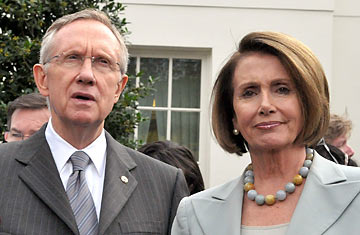
Senate majority leader Harry Reid with House Speaker Nancy Pelosi
With the House set to return to Washington this week, Speaker Nancy Pelosi finds herself walking a narrow line on President Obama's top domestic priority. She had only two votes to spare when the House passed its version of health care legislation back in November, and now her restive caucus is telling her that they will not move too far in the direction of the Senate's more conservative version of the bill.
While there are many differences between the two bills, including abortion funding restrictions and Medicaid expansions, the issue now emerging as the major flash point is the Senate's proposed 40% excise tax on high-cost insurance policies: those individual policies costing upwards of $8,500 and family policies costing more than $23,000 that are being referred to in Washington these days as "Cadillac plans." At this point, about three-quarters of the House Democratic caucus has signed a letter sponsored by Connecticut Congressman Joe Courtney expressing opposition to the tax.
Opponents argue that the people who are covered by those policies are, in many instances, far from wealthy. The Congressional Budget Office estimates that about 1 in 5 workers would be affected by the tax in 2016. And among unionized workers, particularly in states where health costs are higher than average, the percentages are even higher. For instance, the Connecticut Education Association, which delivered petitions to its congressional delegation that were signed by 10,000 of the state's teachers, estimates that the tax would hit 40% of its members the first year alone. And under the provision's indexing formula, even greater numbers of policies would be affected in subsequent years.
Courtney contends that swallowing this tax would be even more difficult for many House Democrats than abandoning the public option, which would have provided a new government-run alternative for covering the uninsured. That is because it would require tens of millions of Americans to give up a benefit they now enjoy — tax-free treatment of their health benefits.
However, Obama has already indicated that he favors the tax. Not only would it raise an estimated $149 billion over 10 years but many health economists argue that it also could put a brake on rising health care costs. According to one aide to the House Democratic leadership, Obama made a "strong case" for the tax in a meeting last week with congressional leaders, and "got an equally strong push back from the House."
Sources on all sides say they believe there ultimately will be a compromise that would maintain the tax but lift the threshold, so that it would be applied to fewer policies. Yet that would leave the question of where to raise the lost revenue; Obama has insisted that any bill that reaches his desk not add to the total federal deficit over the next 10 years.
Pelosi has held a series of conference calls in recent days with members of her caucus, both to gauge their temperature and to prepare them for the fact that they may end up having to swallow many of the Senate provisions. Over on the Senate side of the Capitol, Harry Reid faces an even more delicate challenge in holding together the 60 votes he got to pass the bill on Christmas Eve. That was exactly the number he needed to overcome a Republican filibuster.
With the finish line in sight, Obama has become more engaged in the negotiations, holding near daily consultations with congressional leaders and key interest groups. Says one House leadership aide: "He's talking details, and he's totally aware of everything that has been done to this point ... If he doesn't keep on this on a day-to-day basis, it is going to drift."
Still, despite the fact that the two houses are expediting the process by bypassing a traditional conference committee to resolve their differences, it appears increasingly unlikely that Obama will see a final bill passed by both houses this month as he had hoped. That is not just because of the difficulty in reaching a deal, but also because anything that is proposed must be scored by the Congressional Budget Office for its impact on the deficit, a process that could take nearly two weeks.
